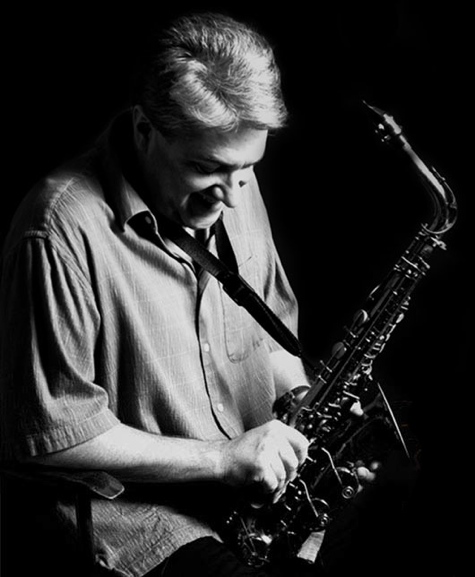 |
|
The Boston Globe
JAZZ NOTES
By Bill Beuttler, Globe Correspondent
February 17, 2006 |
With 'The Round,' altoist comes full circle
After a hiatus, McCabe returns to music business
Alexander McCabe left Massachusetts for New York about a quarter-century
ago to pursue a career in jazz. Tonight the 43-year-old journeyman alto saxophonist
will be back in his home state, touting his charming debut CD, ''The Round,"
at the Acton Jazz Cafe. And his boyhood pal Joe Barbato will be backing him on
piano and accordion, as he does on the CD.
The journey began for McCabe in Newton and Cambridge, where he
grew up in a large, jazz-loving family. His father, retired Tufts English professor
Bernard McCabe, played a prominent role in introducing his eight kids to the music.
''My father's a big jazz fan," says McCabe by phone from
his home in suburban New York, ''and so there was a lot of Charlie Parker around
the house and things like that. When I was 10, I took up the alto."
Ten was also McCabe's age when the family relocated from Newton
to Cambridge, and before graduating high school he was catching sax heroes Jerry
Bergonzi and George Garzone every chance he got in local clubs. He also jammed
regularly with elder brother Matt, the other pro musician to emerge from the McCabe
clan (best known these days for his work with bluesman Duke Robillard), and Barbato.
But McCabe was more of a jazz purist then than other players his age.
''It was strictly a Charlie Parker thing," says McCabe of
his decision to play jazz and the alto sax. ''I listened to the older guys first.
I listened to a lot of Lester Young and Coleman Hawkins and Ben Webster. I've
always listened to a lot of tenor players -- listened to a lot of Coltrane, Sonny
Rollins. When I was older, I got more into the usual [alto sax]
suspects -- Cannonball, Jackie McLean, Eric Dolphy."
Jazz-rock fusion was still going strong in McCabe's early years,
but McCabe had no use for it.
''I always felt that Alexander, when I met him, was a jazz snob,"
recalls Barbato. ''He didn't like anything that wasn't like Charlie Parker-oriented.
And I think he's been a lot more open-minded as he's grown."
McCabe's musical growth took him through private studies with
Bergonzi and Garzone before leaving Boston, and, after he'd moved to finish his
undergraduate studies at New York University, with Lee Konitz, Bob Mintzer, and
George Coleman. He didn't stray from straight-ahead jazz until 1988, when he took
time off from graduate studies at the Manhattan School of Music to hit the road
with Ray Charles for three months.
McCabe's post-graduate apprentice work was busy but under the
radar. He played with Chico O'Farrill's Afro-Cuban Jazz Orchestra on and off for
several years, backed singer Nancie Banks, and worked regularly with Coleman's
drummer son, George Coleman, Jr. He relocated briefly to England, where his father
had moved after retiring, and played jazz in the clubs there. And he made his
most notable foray outside the jazz idiom, performing and recording a
couple of albums with the ska band Mephiskapheles in the early '90s.
In the late '90s, McCabe decided to take a break from the music
business. ''I needed to make some money," he explains. ''I was being a sales
guy. That was kind of a drag."
He kept playing and composing all along, though, and eventually
began inching his way back into the music business. ''I started teaching on the
side a little bit, and sitting in on some friends of mine's gigs," he recalls.
''And finally I just said, 'I think I can go back and do this full time without
relying on the white-collar world.' And so far I've been able to support myself
again."
Last summer, McCabe recorded his self-produced new CD, ''The
Round," with Barbato, bassist Ugonna Okegwo, and drummer Steve Johns. (Todd
Baker and Bob Gullotti will fill in tonight on bass and drums, respectively.)
Five of the eight compositions on it are his own. Highlights include the intriguingly
free ballad ''Village Walk," the slow-to-resolve waltz ''Floating,"
and the straight-ahead-jazz-meets-Latin-rhythm ''Jugo," of which McCabe says:
''There's a couple of
weird harmonies in there, but it's mostly just like a hard-bop line. We put it
over a Cuban montuno and it worked. My wife's Cuban, so that's my nod to her,
maybe."
Then there's the title tune, also McCabe-penned, whose echoes
of Irish folk music make it the CD's most unusual track. ''I like Irish music
and am interested in Ireland," explains McCabe. ''I'm part Irish and was
just trying to think of something to incorporate Joe's accordion playing. Instead
of having a jazz song where he plays accordion, I wanted to make it like an Irish
song and play it jazzily, basically."
The emphasis throughout was more on making engaging music as
a team than on showing off individual chops.
''It's not like we play 'Cherokee' and everyone takes eight choruses
and see how fast we can play," says McCabe. ''I wanted to play something
that was just groove-oriented, something that people could latch onto.
''But still," he adds, ''it's jazz. We're improvising there.
It's not smooth jazz by any means."
© Copyright 2005 The New York Times Company
Back to Press page
|


